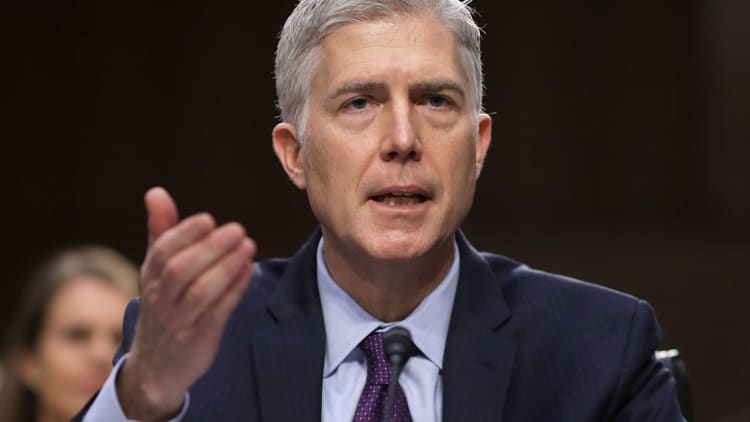
The Senate voted Thursday to scrap the filibuster on Supreme Court nominees in order to move toward confirming Neil Gorsuch, a historic move with wide implications for the top American court.
The chamber voted 52-48, along party lines, to take the "nuclear option," removing the 60-vote threshold to advance Supreme Court nominations in favor of a simple majority. Earlier Thursday, Democrats blocked the cloture vote on Gorsuch, President Donald Trump's pick for the court.
The Senate then voted 55-45 to advance Gorsuch's nomination for an expected Friday confirmation vote. Three Democrats up for re-election in red states — Heidi Heitkamp of North Dakota, Joe Manchin of West Virginia and Joe Donnelly of Indiana — voted to end debate.
Changing the rules would have potentially far-reaching effects in the Senate, which has found itself locked in partisan battles over nominees in recent years. The move may make it easier for presidents of either party to push through heavily ideological or unpopular nominees, as they will need less broad support.
Before the rules change, Senate Republicans failed to reach the 60 votes needed to advance Gorsuch, garnering only 55 for the move while 45 senators opposed it. Majority Leader Mitch McConnell then started to take the steps that led to
The GOP holds 52 seats in the 100-member chamber.
"This will be the first, and last,
Democrats Heitkamp, Manchin, Donnelly and Michael Bennet of Colorado voted against the filibuster. McConnell voted against advancing the nomination after it was clear that it would fail for procedural reasons.
Following the first cloture vote, Minority Leader Chuck Schumer tried another delaying tactic. He aimed to push the vote to April 24, but the motion failed.
In 2013, when Democrats held the Senate majority, they changed the chamber's rules to require only a simple majority for non-Supreme Court judicial nominations and Cabinet officials.
Democrats raised concerns that Gorsuch could be too friendly to corporations and may allow limits on political contributions to erode. In announcing their opposition to the 49-year-old Colorado appeals judge, many Democrats also said he was evasive when answering questions in his confirmation hearing.
Republicans' decision not to hold a hearing on Judge Merrick Garland, whom President Barack Obama nominated for the same seat during his last year in office, also drove some of the partisan entrenchment against Gorsuch.
"We believe that what Republicans did to Merrick Garland was worse than a filibuster," Schumer said
Gorsuch, if confirmed, will fill the seat vacated by conservative Justice Antonin Scalia's death last year.
Republicans have looked for a notable victory in a Congress that has proven turbulent and partisan since Trump took office in January.
The rule requiring a supermajority for a cloture vote dates back to 1917, when the U.S. was considering entering World War I, and then needed 67 votes, according to the Senate website. It was reduced to 60 votes in 1975.
— The AP contributed to this report


